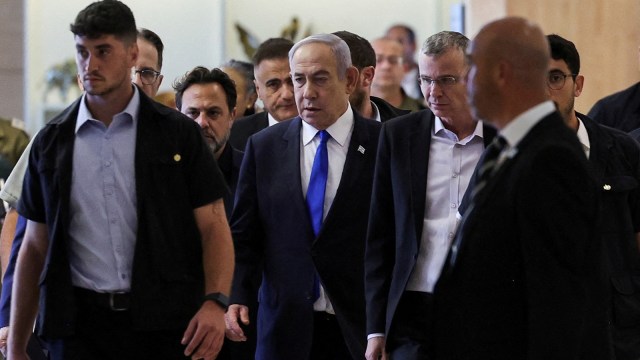ICC warrants against Israel, Hamas leaders: Powerful can be held ...
Israeli Prime Minister Benjamin Netanyahu arrives to his Likud party faction meeting at the Knesset, Israel's parliament, in Jerusalem May 20, 2024. (Reuters/ Ronen Zvulun)

In a noteworthy international development, the International Criminal Court (ICC)’s prosecutor, Karim Khan, has requested the court to issue arrest warrants against leaders of Israel — Prime Minister Benjamin Netanyahu and Defence Minister Yoav Gallant — and leaders of Hamas — Yahya Sinwar, Mohammed Diab Ibrahim Al-Masri (Deif) and Ismail Haniyeh. The arrest warrants are sought on the charges of war crimes and crimes against humanity over the October 7 attack on Israel and the subsequent war in Gaza. The ICC, in recent times, has come under scathing criticism for targeting leaders of the third world, and not Western powers and their allies. The application to issue arrest warrants against the leaders of Israel, thus, is a first and quite significant one. It can be argued that by charging both the Hamas leadership and the Israeli leaders, the prosecutor is seemingly giving an impression of being balanced and even-handed.
Under international law, heads of state are immune from criminal proceedings at any foreign or international court. At the ICC, however, no head of state can claim immunity. ICC statute says that “official capacity as a head of state or government, a member of a government or parliament, an elected representative or a government official shall in no case exempt a person from criminal responsibility”. The same was ruled in 2019 by the court in the Jordan Referral re Al-Bashir Appeal judgment. It is because of this provision that the court, in 2023, was able to issue an arrest warrant against Russian President Vladimir Putin for his role in Russia’s war with Ukraine.

Like Russia, Israel, too, isn’t a member of the ICC. Thus, some are questioning if the ICC can issue arrest warrants for Israeli leaders. The basis of ICC’s jurisdiction in this case is that Palestine is a state party to the court. Thus, the ICC can exercise what is known as territorial jurisdiction. This means that if a crime is committed on the territory of a state party to the ICC, the Court can exercise jurisdiction on that crime, even if it is committed by people belonging to a state that isn’t its member. Hence, the crimes committed by Israeli soldiers in Gaza fall within the Court’s jurisdiction. Similarly, Hamas’ conduct in Israel falls within the Court’s jurisdiction even though Israel isn’t a member of the ICC.
There is generally a long road from requesting an arrest warrant to actual prosecution. The ICC’s track record is not quite encouraging, especially regarding heads of states. Take the example of Omar al-Bashir, former Sudanese President. ICC issued an arrest warrant against him way back in 2009. At the time, he was the president of Sudan. In 2019, he was ousted from office in a military coup. However, he has still not surrendered to the court. On the other side of the spectrum are the cases of William Ruto, the incumbent President of Kenya, and his predecessor, Uhuru Kenyatta. Both were accused of committing crimes against humanity, but the court finally dropped the charges and abandoned the prosecution. Similarly, an arrest warrant was issued against Simone Gbagbo, the former first lady of the Ivory Coast, but the ICC subsequently dropped the charges. Likewise, while the arrest warrant against Putin has undoubtedly limited his international travels, his surrender to the ICC seems unlikely.
Notwithstanding this somewhat dismaying history of the ICC, the application for arrest warrants against the Israeli leaders is momentous for three reasons. First, if the court issues the warrant in the coming months, it would be a big legal and diplomatic blow to Israel, which is already battling several other international cases. Second, it would severely curtail Netanyahu’s travels to countries that are parties to the ICC because these countries would be under a legal obligation to arrest him. Third, and most importantly, it sends a robust signal that international law is not a hapless weapon that miserably fails to hold the powerful accountable. This case can prove to be the litmus test for the ICC’s credibility and legitimacy in the eyes of the world at large.
Ranjan is a Humboldt Fellow and professor, Jindal Global Law School. Kumar is a PhD candidate, Australian National University. Views are personal
© The Indian Express Pvt Ltd
First uploaded on: 27-05-2024 at 08:05 IST

































